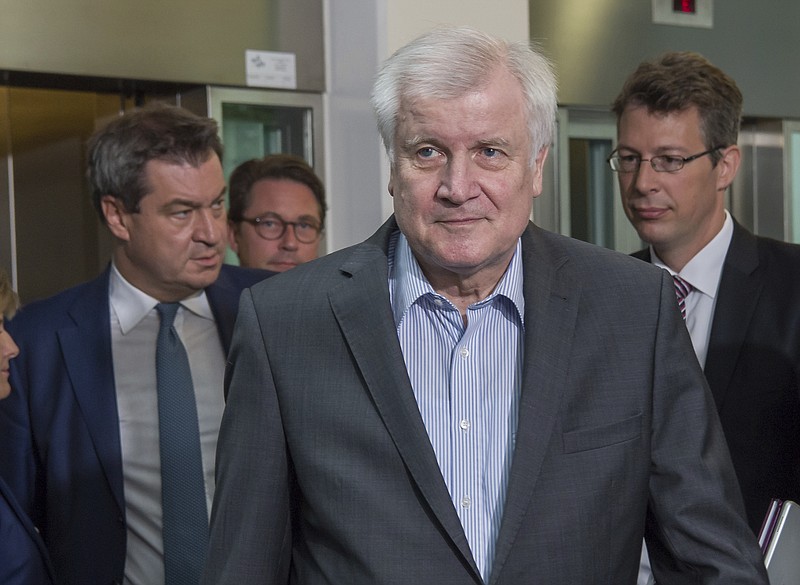BERLIN (AP) — Chancellor Angela Merkel’s allies in Bavaria averted an immediate collision Monday with the German leader, giving her two weeks to make deals on migrants with other European countries instead of turning them back unilaterally at Germany’s border.
In her fourth term at the helm of Europe’s largest economy, Merkel made it clear she has no intention of being pushed around after an internal power struggle over immigration escalated into a threat to her government.
She said she would report back July 1 on the results of her negotiations, and as far as she’s concerned it’s not yet clear what will happen if there’s no European deal on the divisive topic.
Her interior minister, Horst Seehofer, has been calling for Germany to turn back migrants at the border who have previously applied for asylum or registered as asylum-seekers in other European countries.
Merkel opposes such unilateral action, arguing it would increase pressure on Mediterranean countries such as Italy and Greece and weaken the entire 28-nation European Union.
Seehofer heads the Bavaria-only Christian Social Union, the sister party to Merkel’s Christian Democratic Union. The CSU is determined to show that it’s tough on migration, arguing this is the best way to cut support for the anti-migration, far-right Alternative for Germany party ahead of a challenging state election in Bavaria in October.
A CSU leadership meeting Monday in Munich unanimously backed Seehofer’s plan to give Merkel until the end of the month to find a solution with other EU countries. That banished — if only for now — the specter of Seehofer pushing through his proposal in defiance of the chancellor, which would risk bringing down her government.
Asked in Berlin whether her government can work well until the end of its term in 2021 and whether she is still in full control, Merkel replied: “Yes to both.”
Merkel emphasized the need for Germany’s conservative parties to stick together, but she and Seehofer may only have delayed a head-on collision.
“We think that turning people back without consultation at our borders, as a country at the heart of Europe, could lead to negative domino effects that could also hurt Germany and ultimately lead to the questioning of European unity,” Merkel said after her party’s leadership met.
Merkel said she would hold bilateral agreement talks during a June 28-29 EU summit. Her party will consider the results July 1 “and decide how to proceed in light of what has been achieved,” she said.
It wasn’t immediately clear what she might offer other countries in the talks. Merkel said she will have to discuss “what is important for others; I can’t say today what that is.”
Hours later, Merkel met in Berlin with Italian Premier Giuseppe Conte, the head of a new, populist government whose interior minister has pledged to deport tens of thousands of migrants.
The German leader noted Italy and Germany have been disproportionately affected by recent mass migration to Europe, where Italy is often the point of entry for new arrivals and Germany the hoped-for destination.
Merkel said European nations needed to work harder to help Libya and other points of departure to provide for refugees so they don’t attempt the perilous trip across the Mediterranean Sea. She also called for doing more to stop human smugglers.
“We want to support Italy’s desire for solidarity, and also hope that Germany receives understanding when it comes to the question of European solidarity on the question of migration,” she said.
Saying he appreciated Merkel’s acknowledgment of Italy’s situation, Conte reiterated his view that EU accords that link asylum-seekers to the first country they reach should be replaced.
The Italian government is proposing so-called “hotspots” in migrants’ countries of origin or transit to prescreen asylum candidates before they set out for Europe.
Such an approach, Conte said, would reflect more of a shared view of the challenge and less of what he said was the prevailing attitude now that “he who sets foot in Italy sets foot in Europe.”
In Munich, Seehofer said his party would be happy to see European or bilateral solutions this month that “achieve the same that we can achieve by turning people back at the border.”
“We wish the chancellor success in this,” he said. “But we stand by our position that, if this does not succeed, turning people back immediately at the border must be possible.”
Seehofer said he told fellow leaders that “we’re not out of the woods yet.”
He said he would go ahead with preparations to block some asylum-seekers at the border in case Merkel’s negotiations on getting other countries to take back migrants don’t bear fruit.

